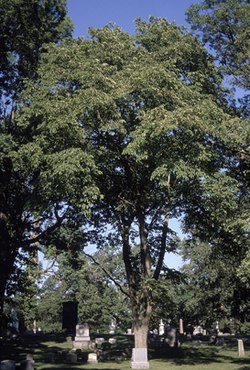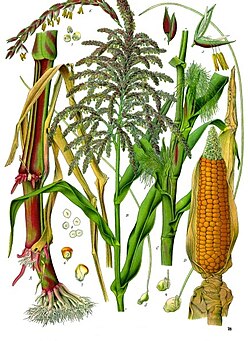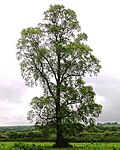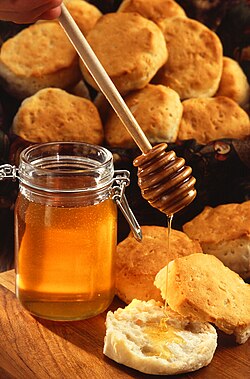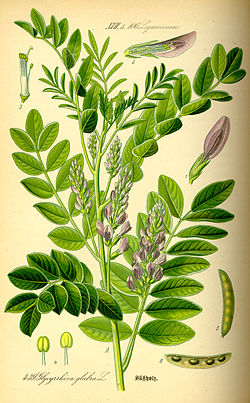A demulcent (derived from the Latin: demulcere "caress") is a mucilaginous or oleaginous preparation that forms a soothing protective film over a mucous...
2 KB (217 words) - 22:16, 31 October 2024
relief of sore throat, coughs, hoarseness and aphonia. It is a throat demulcent and expectorant. The name is mostly in Cantonese. In the name of the company...
7 KB (743 words) - 10:41, 12 December 2024
lozenges generally use either zinc gluconate glycine or pectin as an oral demulcent. Several brands of throat lozenges contain dextromethorphan. Other varieties...
4 KB (367 words) - 01:37, 4 May 2025
used in refining sugar, for making ropes and its infusion is used as a demulcent. The leaves are used as an application to pustular eruptions. The buds...
4 KB (400 words) - 13:21, 3 June 2025
Ulmus rubra (category Demulcents)
as a demulcent, and is still produced commercially for this purpose in the United States with approval for sale as an over-the-counter demulcent by the...
21 KB (2,162 words) - 07:03, 3 June 2025
220 ft). E. amoenum has been advocated for a variety of effects such as demulcent, anti-inflammatory and analgesic, especially for the common cold, and...
5 KB (485 words) - 09:52, 30 May 2025
produces a blue-green sap, which has medicinal value as a mild laxative, demulcent, and weak expectorant. The young seedpods, also known as "keys", are edible...
25 KB (2,521 words) - 20:45, 2 June 2025
Maize (category Demulcents)
Maize (/meɪz/; Zea mays), also known as corn in North American English, is a tall stout grass that produces cereal grain. It was domesticated by indigenous...
88 KB (9,199 words) - 17:24, 23 May 2025
anti-toxic, antimicrobial, anti-inflammatory, anti-histamine, as well as demulcent, expectorant, styptic and diuretic. Externally, a poultice of the leaves...
16 KB (1,627 words) - 20:16, 10 February 2025
Oat (category Demulcents)
The oat (Avena sativa), sometimes called the common oat, is a species of cereal grain grown for its seed, which is known by the same name (usually in the...
48 KB (5,079 words) - 21:42, 29 May 2025
Flax (category Demulcents)
Flax, also known as common flax or linseed, is a flowering plant, Linum usitatissimum, in the family Linaceae. It is cultivated as a food and fiber crop...
51 KB (5,760 words) - 14:43, 1 June 2025
Malva sylvestris (category Demulcents)
fruit. The seeds are used internally in a decoction or herbal tea as a demulcent, and the leaves may be used in poultices as an emollient for external...
25 KB (2,130 words) - 21:51, 8 March 2025
(Ulmus rubra), a North American tree species, has long been used as a demulcent and cough medicine, and is still produced commercially for that purpose...
12 KB (1,195 words) - 13:35, 7 May 2025
inner bark of the slippery elm (Ulmus rubra) has long been used as a demulcent, and is still produced commercially for this purpose in the US with approval...
74 KB (8,447 words) - 12:58, 14 June 2025
Glycerol (category Demulcents)
Glycerol (/ˈɡlɪsərɒl/) is a simple triol compound. It is a colorless, odorless, sweet-tasting, viscous liquid. The glycerol backbone is found in lipids...
52 KB (5,008 words) - 20:59, 29 May 2025
olitorius leaves is mulukhiyah. Consumption of the leaves is reported to be demulcent, deobstruent, diuretic, lactagogue, purgative, and tonic. It is also a...
20 KB (2,277 words) - 12:45, 29 April 2025
Honey (category Demulcents)
Honey is a sweet and viscous substance made by several species of bees, the best-known of which are honey bees. Honey is made and stored to nourish bee...
119 KB (12,850 words) - 23:01, 7 June 2025
traditional medicine, A. indicum various parts of the plant are used as a demulcent, aphrodisiac, laxative, diuretic, sedative, astringent, expectorant, tonic...
6 KB (599 words) - 09:05, 25 May 2025
Verbascum thapsus (category Demulcents)
Verbascum thapsus, the great mullein, greater mullein or common mullein, is a species of mullein native to Europe, northern Africa, and Asia, and introduced...
53 KB (5,306 words) - 13:32, 10 June 2025
marked by local anaesthesia. The seeds ... are considered to be tonic, demulcent, alternative [restorative], laxative, emmenagogue, diuretic, anthelmintic...
27 KB (3,325 words) - 14:42, 18 December 2024
grippe, gas, blood strengthening, headaches and other pains, rheumatism, demulcent, nasal inflammation, anthelmintic, for the eyes, abortifacent, for the...
57 KB (5,979 words) - 00:25, 8 June 2025
liquorice, though they are somewhat bitter. In Java the roots are considered demulcent. The leaves, when mixed with honey, are applied to swellings, and in Jamaica...
27 KB (3,121 words) - 09:33, 16 April 2025
C. halicacabum. The 1989 book records that “The root is diuretic and demulcent. It is mucilaginous, but has a nauseous taste, and is used to treat rheumatism...
9 KB (1,106 words) - 00:46, 17 April 2025
produces a blue-green sap, which has medicinal value as a mild laxative, demulcent, and weak expectorant. The names of both the sugar mannose and its hydrogenated...
37 KB (4,245 words) - 18:22, 28 May 2025
diuretic Licorice anti-spasmodic, anti-tussive, for peptic ulcer Sesame seed diuretic, galactagogue, demulcent Star anise antiseptic, anti-rheumatic...
18 KB (1,812 words) - 14:54, 14 April 2025
large doses, the leaves and flowers may be used as an astringent, as a demulcent for slow-healing injuries, and as a diuretic. "Hepatica Mill.". Plants...
14 KB (1,329 words) - 00:25, 3 May 2025
Althaea officinalis (category Demulcents)
Althaea officinalis, the marsh mallow or marshmallow, is a species of flowering plant indigenous to Europe, Western Asia and North Africa, which is used...
11 KB (1,169 words) - 22:34, 3 May 2025
Liquorice (category Demulcents)
Liquorice (Commonwealth English) or licorice (American English; see spelling differences; IPA: /ˈlɪkərɪʃ, -ɪs/ LIK-ər-ish, -iss) is the common name of...
22 KB (2,287 words) - 21:20, 29 May 2025
properties and is often referred to as tragacanth gum. The gum acts as a demulcent, which soothes irritated tissues making it helpful in treating burns....
4 KB (547 words) - 10:50, 13 May 2025
Pectin (category Demulcents)
from biological systems. Pectin is also used in throat lozenges as a demulcent.[citation needed] In cosmetic products, pectin acts as a stabiliser. Pectin...
41 KB (4,752 words) - 00:18, 27 May 2025




